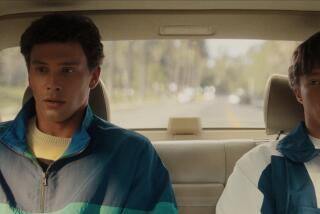Legally Binding : ‘Minor Demons’ is a story of friendship and betrayal revolving around a youth’s confession of murder.
- Share via
BURBANK — A teen-age boy mindlessly, brutally kills a teen-age girl. He confesses to the crime. But his Miranda rights aren’t correctly read to him by the police. The mistake could be enough to get the boy off.
Is this justice?
Bruce Graham isn’t exactly saying. His 1991 play, “Minor Demons,” opening tonight in its Los Angeles premiere at the Alliance Repertory Company, observes the maelstrom of the crime and its aftermath--and the friends swept into it.
And because it observes rather than jumps to conclusions about crime and punishment, “Minor Demons,” Graham has found, leaves the audience with a good deal to argue about. Although the Miranda ruling--requiring arresting officers to inform the accused of their rights--has been weakened in recent years by the Supreme Court, its essence remains: a legal right, constitutionally reinforced, which can also be used by defense attorneys such as the play’s Deke Winters to free accused murderers.
“Deke, of course, is doing what any competent defender would do,” says Graham, 37, by phone from his Media, Pa., home. Deke’s best buddy, Vince, happens to be the cop who forgot to read the rights, “so, of course, Vince sees this, rightly, as a lawyer’s trick. My ethic as a playwright is to try and put myself in the mind of each character I create. In each mind, they believe they are doing the right thing. Vince is right--this kid shouldn’t be let out. But Deke is right too--the law is the law.
“If this sounds like I’m equivocating, then I suppose I am. The legal process produces complicated realities and reactions, and my emotions and reason are constantly pulling me from one side of the issue to the other. That’s probably true for most of us.”
For a play so involved in the matrices of friendship, law and justice, “Minor Demons” assiduously avoids the courtroom. “I wanted to stay away from that arena, because this is about Deke and Vince. But, boy, I really, really want to write a courtroom play. When I was in school, I got all wrapped up in ‘Inherit The Wind,’ Clarence Darrow and that whole grand lawyering tradition.”
*
Graham even thought that, after graduating with a theater degree from Indiana University ( not in the state of Indiana, but in his Pennsylvania hometown of Indiana) that he might try the law.
“I would go to court in Media,” he says, “and notice how awful, how simply incompetent some of the attorneys were. I could do better than that, with my acting skills alone. It looked like an easy way to make a lot of money.”
Graham didn’t turn barrister; instead, he embarked on--as American playwriting careers go--a remarkably successful ride. Because of his position as resident playwright for the Philadelphia Festival for New Plays, Graham has been able to write and see his several plays produced--starting with his first, “Burkie,” now in an Interact Theatre Company production in North Hollywood. (The simultaneous Valley shows are “a total accident, since neither theater knew the other was doing one of my plays.”)
Although the narrative of “Minor Demons” developed from two Pennsylvania murder cases, both involving young men whom Graham knew, the mainspring was simpler and more vexing. “I’ve had close friends since the fourth grade. I wondered one day what would happen if I ever betrayed one of them. That notion percolated for several months, and then the murder cases came to mind. That, and going to lunch with a lot of lawyers and picking their brains.”
And while some may argue about the justice of the justice depicted in “Minor Demons,” Graham may find himself debating another of the play’s debatable points with director, Louis D’Esposito. Although Graham insists that the teen-age boy, Kenny, is a sociopath, D’Esposito equally insists that he is possessed by demons.
“He sees the same demons in Deke,” says D’Esposito, sitting with producer and actor Cheri Caspari.
Caspari readily admits that the company originally rejected “Minor Demons” when it was submitted two years ago by Al Sapienza, who plays Deke. Sapienza stuck by the play, and with further refinements in subsequent productions at New Haven’s Long Wharf Theatre and Tucson’s Arizona Theatre Company, the play received a second look by the Alliance group.
“We do like to explore the darker side of characters and society,” Caspari says, “and how we reconcile that with living. We’re hoping this show explores that idea a little further than we’ve gone before.”
Where and When
What: “Minor Demons.”
Location: Alliance Repertory Company, 3204 Magnolia Blvd., Burbank.
Hours: 8 p.m. Thursdays through Saturdays. Ends July 23.
Price: $15.
Call: (213) 660-8587.
More to Read
The biggest entertainment stories
Get our big stories about Hollywood, film, television, music, arts, culture and more right in your inbox as soon as they publish.
You may occasionally receive promotional content from the Los Angeles Times.










